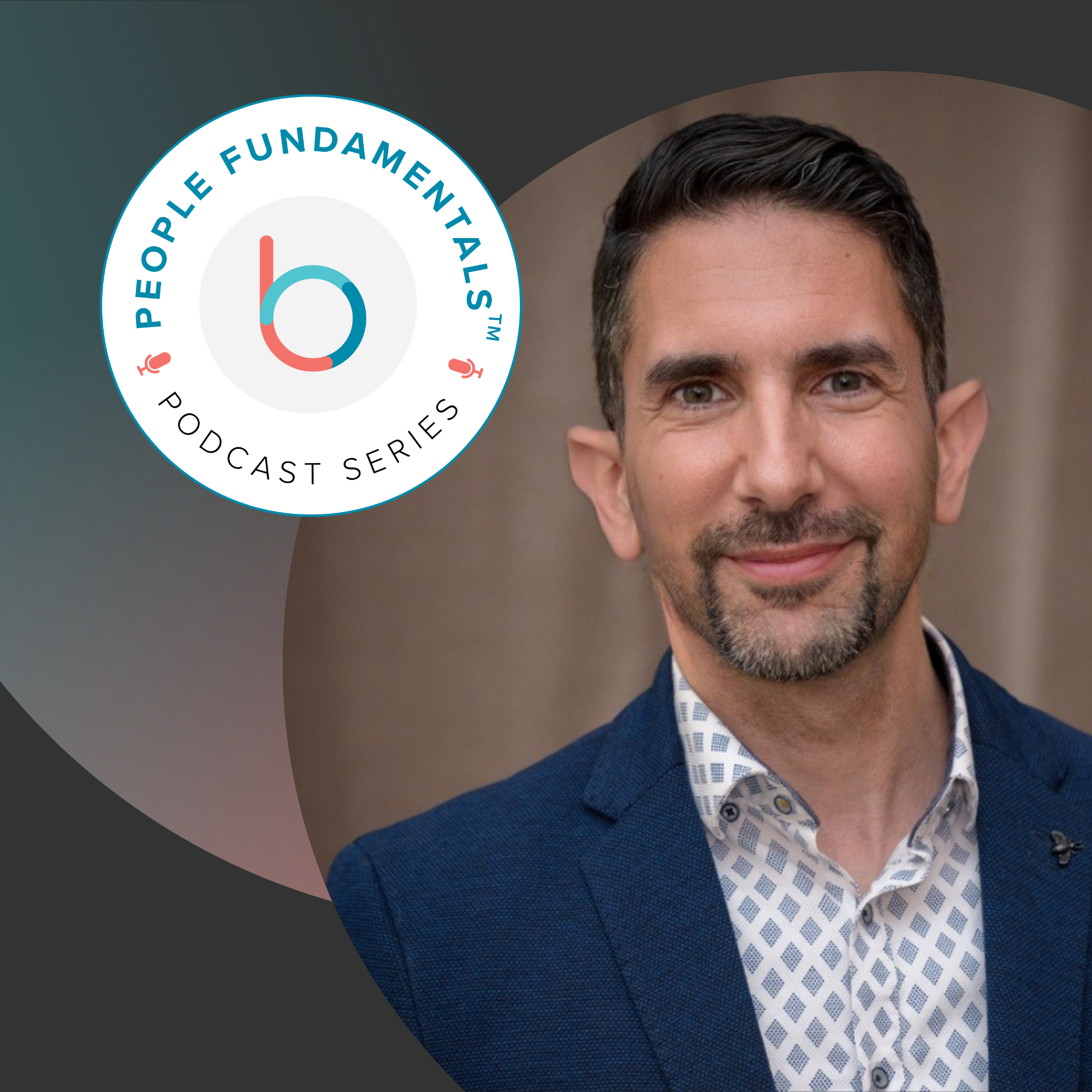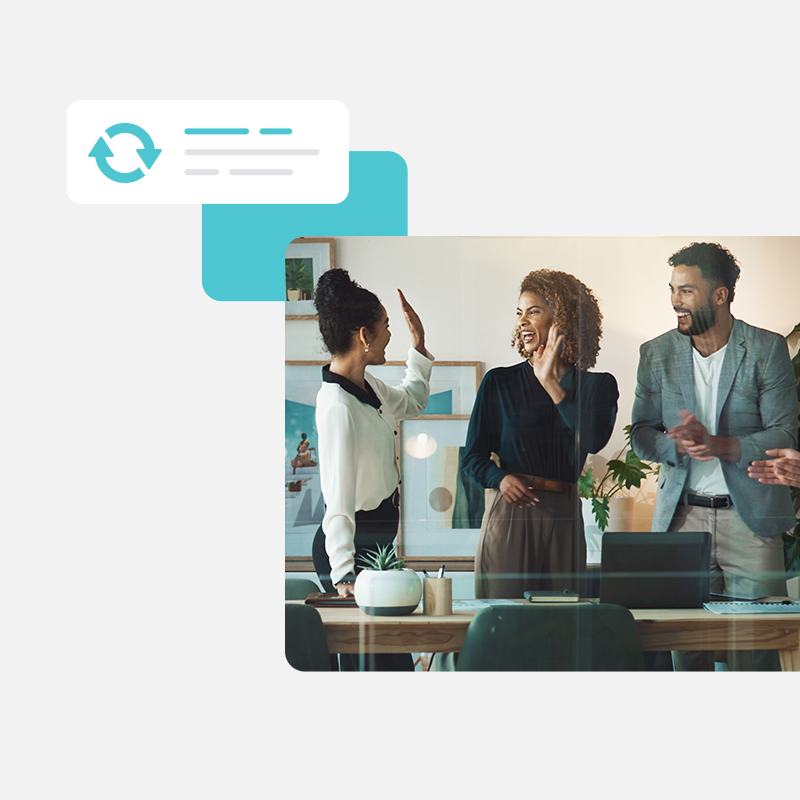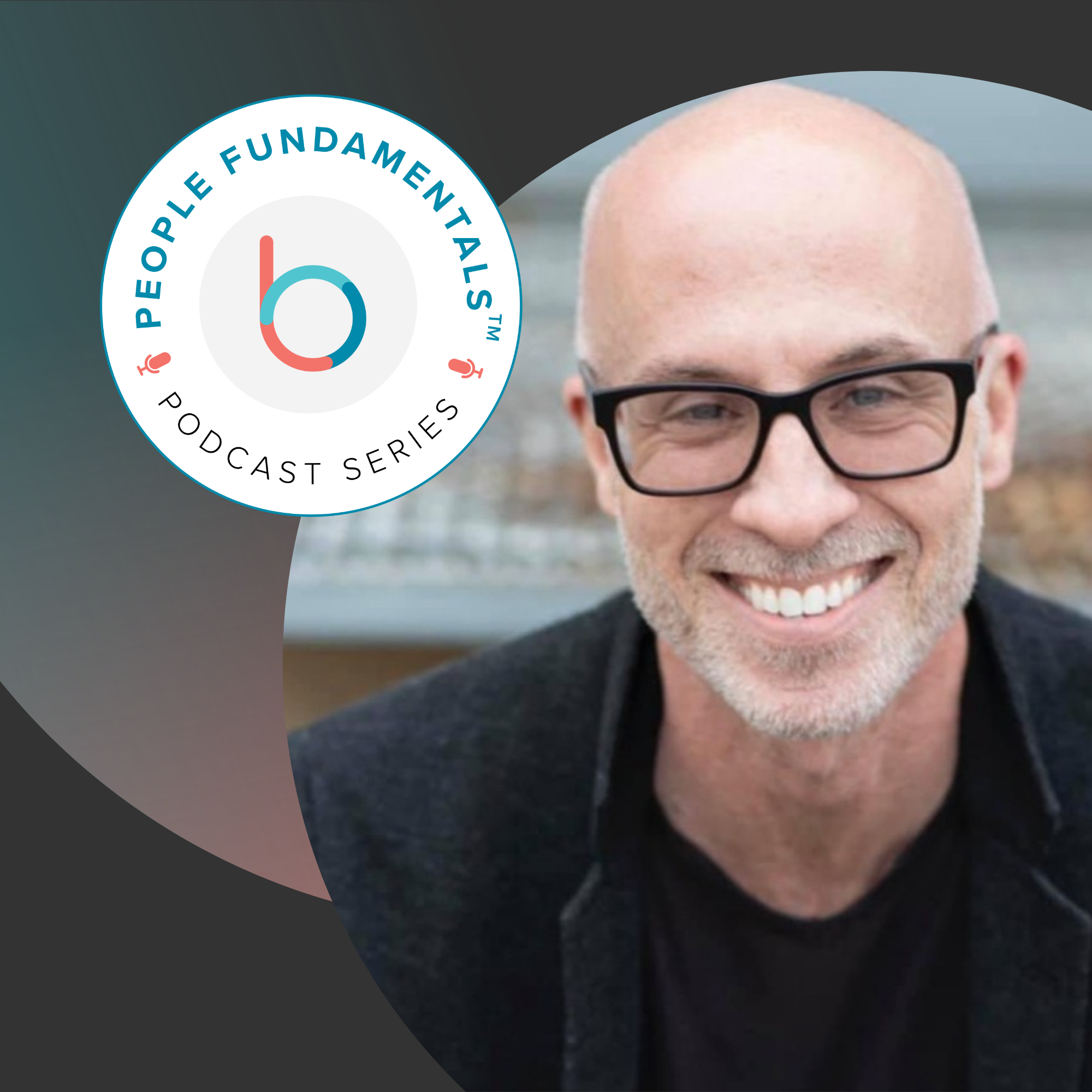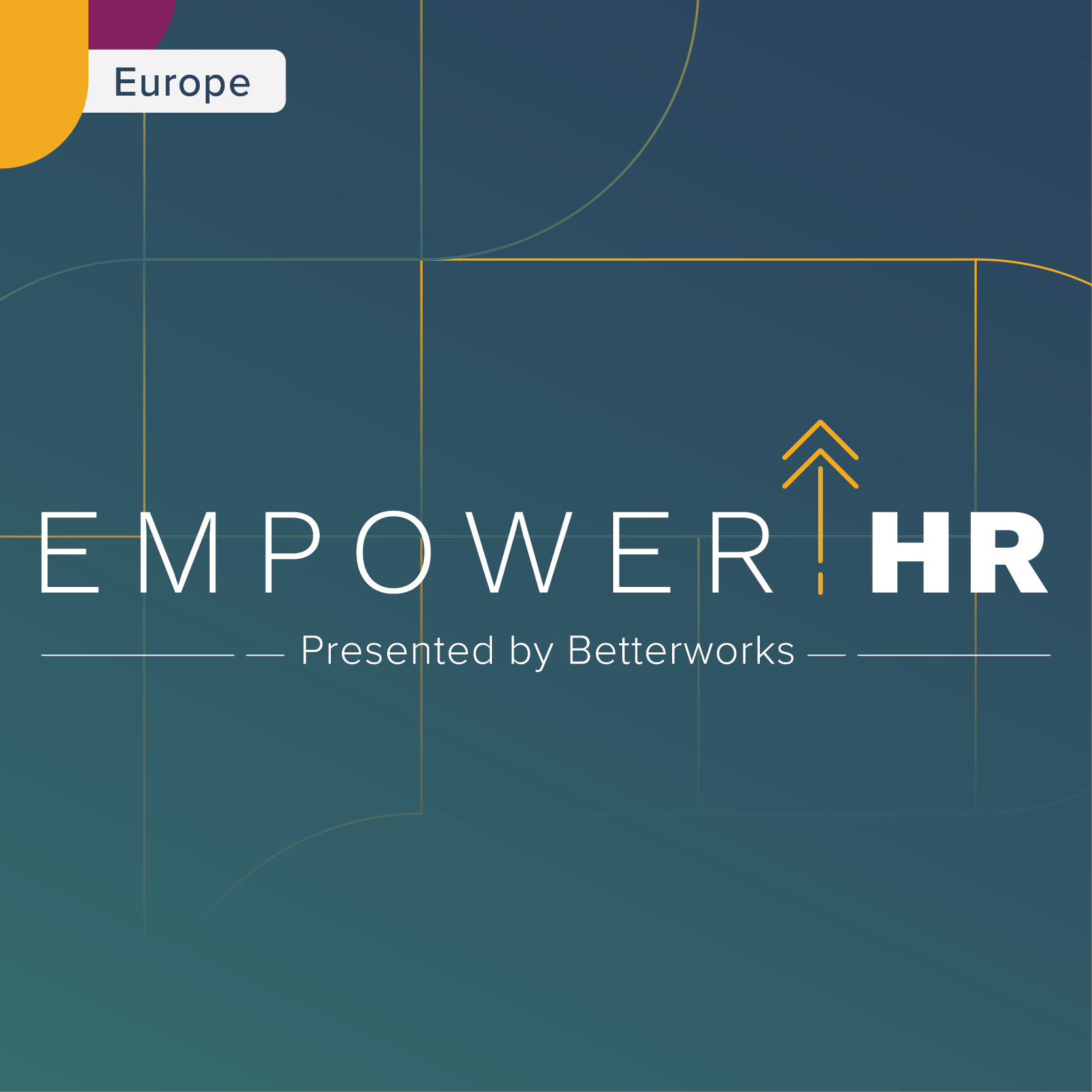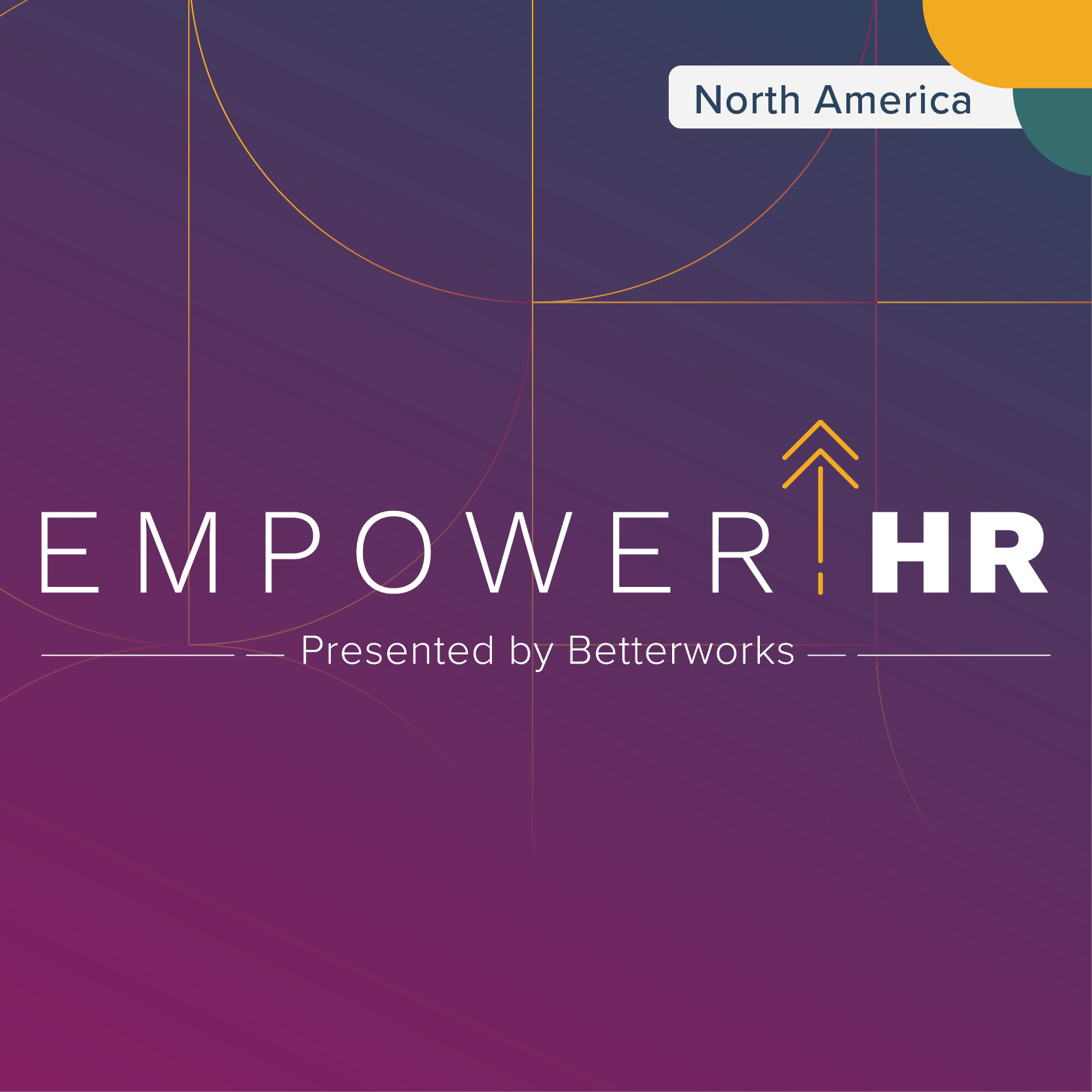On this episode of People Fundamentals, I’m joined by Amit Sion, chief revenue officer at X-Team. X-Team has crafted a unique culture for its globally distributed workforce, bringing developers together in over 60 countries with innovative engagement strategies and an impressive 97% retention rate. From establishing trust to promoting whole-person well-being, Amit shares X-Team’s secrets for creating an environment where employees feel connected, valued, and motivated.
“It has to start with trust and transparency with people,” Amit says. “If you do that, then you’ll attract the right people.”
In this conversation, recorded live at HR Tech 2024 in Las Vegas, Amit discusses the importance of a trust-centered culture, along with practical ways to boost employee engagement and care holistically for team members, even across vast distances.
Listen in as we explore the critical elements for retaining a thriving, engaged workforce, regardless of location, and how X-Team brings those elements to life.
Subscribe wherever you listen to podcasts: Apple Podcasts | Spotify | YouTube Music
Focusing on building trust and connections
Amit explains that X-Team’s culture of trust and transparency starts at the hiring stage and builds through intentional, ongoing practices. X-Team’s global employees understand from the outset that this is a place where they are encouraged to bring their full selves to work. “We don’t say work from home; we say work from anywhere,“ Amit says. “We encourage people to use the time to travel, to live their lives. But we want them also to infuse their lives so that it’s not a work life balance. It’s a life balance.” By empowering team members to work in ways that fit their lives, X-Team creates a secure and connected environment, even for those who may never meet in person.
Building this trust-based culture has been key to X-Team’s high retention rate. Amit explains that employees often find a sense of community within X-Team that was missing in previous roles. Many X-Teamers have shared how isolating it was to sit in an office without genuine engagement. X-Team counteracts that through intentional practices and a commitment to making sure they feel like they’re part of something. This commitment is what keeps people engaged, productive, and genuinely connected to each other and the organization.
Getting creative with employee engagement
X-Team’s approach to engagement goes beyond typical team-building exercises. Through gamification and personalized interactions, X-Team makes remote work feel like an adventure. Employees participate in “quests” that align with personal interests — such as fitness, music, or movies — and earn points that can be exchanged for exclusive company merchandise. This culture-driven gamification creates a shared experience that transcends borders and brings the team closer.
“What we want to do is to make sure that we’re watching out for people,” Amit explains, highlighting the goal of gamification as a tool to prevent isolation and foster community. The company’s “quests” bring people together, whether they’re sharing a fitness goal or discussing a favorite sandwich. “We’re all humans and we all have things that we want to bond over,” Amit says. “It really is quite beautiful, the interconnections that X-Team provides to people’s lives.” These small, creative steps build a solid foundation of connection and engagement across the company.
Taking care of the whole person
To ensure that employees are not just productive but thriving, X-Team provides a $2,500 Unleash budget that supports personal wellness. “It’s $2,500 per year that they can use for very specific things, for things that empower everything else in their live,” Amit says. “So this is for their gym membership, for getting babysitting so that they can go out, for movie tickets, for taking family for dinner — all these things that will enrich their lives.” This approach, Amit notes, is essential to making employees feel valued as whole people, not just workers.
The company also offers a unique “Outpost” experience, hosting employees in global locations for work retreats where they can build bonds in person. By covering accommodations and encouraging team members to travel and meet, X-Team reinforces the value of community. The Unleash budget enables X-Team’s leadership to provide the team with everything they need to thrive beyond their desks — demonstrating how investments in personal growth and self-care contribute to sustained engagement and satisfaction.
X-Team’s approach to employee culture exemplifies how trust, creativity, and whole-person support can foster a vibrant, high-retention workplace. Amit’s insights demonstrate that remote work can be more than transactional — it can be a meaningful, connected experience that values employees holistically. By building a culture that prioritizes openness, engagement, and genuine care for the individual, X-Team has created a model that not only retains talent but enriches their lives.
People in This Episode
Amit Sion: LinkedIn
Transcript
Amit Sion:
It has to start with trust and transparency with people. If you do that, then you’ll attract the right people. You want to make sure that you are being very open with the people that you hire, that this is what we do and this is how we work, so that people walk in and they’re not tricked into joining, and then get a different perspective of what it is. If you want the best out of someone, you want to make sure that you’re creating an environment that suits them. So set up that as your foundation and you will draw the right people in and retain them.
Ashley Litzenberger:
Hi, and welcome to Betterworks’ People Fundamentals podcast. I’m your host, Ashley Litzenberger, senior director of product marketing. Betterworks’ core belief in People Fundamentals revolves around helping HR lead through constant change by focusing on core values like fairness, support, balance, and enabling growth opportunities for employees. These tenants empower everyone in the workforce to strive for excellence, to foster creativity, and to acknowledge each other’s contributions. Betterworks believes that strategic HR leaders can translate these principles into action, shaping their workforce for the better and helping drive meaningful business outcomes. And in this show, we’re diving even deeper into these principles by listening to experts share how you can make them come alive at your organization.
Today, I’m excited to bring you an episode recorded live at HR Tech 2024 with a fantastic guest, Amit Sion, chief revenue officer at X-Team. X-Team is known for providing high-performing on-demand teams of software engineers to some of the world’s leading brands. But beyond their technical excellence, they’ve built an incredible culture that keeps people engaged and motivated, even though their entire team is remote and spread across more than 60 countries.
In this conversation, Amit walks us through how X-Team has cultivated a deeply connected, globally distributed workforce that thrives on trust, gamification, and personalized support. We’ll talk about how they’ve achieved an astounding 97% retention rate, a number that’s nearly unheard of in the tech space. Amit discusses X-Team’s unique approach to employee engagement, including how they use gamification and a life-first philosophy to make sure every team member feels supported, whether they’re working on client projects or taking care of their personal lives. So whether you’re leading a remote team or just looking for innovative ideas to boost engagement and retention, this episode is packed with insights you won’t want to miss.
Amit, thank you so much for joining us today. We’re so glad to have you.
Amit Sion:
It’s such a pleasure. This is pretty awesome to be here at a conference and be able to do a podcast. It’s really neat.
Ashley Litzenberger:
The buzz and the energy is incredible. Well, I’d love to just dive in because your organization is so interesting in what you do. You help plug software engineers into companies as full-time employees, and help take up that extra bandwidth and deliver what they’re looking for. I can imagine that, A, it’s very difficult to source your talent, but then, B, keep it in-seat because you’re always plugging into other organizations. So what is talent retention at your organization?
Amit Sion:
Well, it’s really interesting if I take it a step back, the whole thing of the challenge of sourcing the right people, that’s something that we haven’t really had as a challenge because we have a culture that people want to be a part of. That feeling of being an X-Teamer is a position of pride, and it’s really well known in the software engineering space that software engineers vie to be an X-Teamer. So we actually get hundreds of thousands of people applying to get in, and it usually takes them a few years, but once they do, it’s such a celebration. So every month I actually celebrate all the new X-Teamers that join and then anniversaries of people that have been with us for 5, 10, 12, 15 years, which is really exciting in the IT sector.
But with regards to retention specifically, we have actually a 97% retention of our engineers, and that is a very strong element for X-Team. We want to make sure that… it’s so hard to get in. Once someone gets into X-Team, we want to make sure that we retain them, we keep them within us. So there’s several different spokes of work that we do in order to do that.
Ashley Litzenberger:
I am so curious because we hear about a lot of organizations where it is hard to get through the application process. There are many leading organizations, but having a retention rate of 97%, you said, is extraordinarily remarkable. So what is it about your culture that leads to folks wanting to come in and join the organization and then stay at the organization?
Amit Sion:
Well, it started with the principle that the founder had from the very beginning. So the company’s been around for about 18 years, and he’s based in Australia, but his position was that the best developers are not necessarily in your neighborhood, they’re anywhere in the world. So he said, “I’m going to open the doors and let the best talent apply.” So whilst he’s in Australia, his employee number two was in Poland, employee number three was in Canada. And he just kept going on from there. And the position was to not distinguish between borders like culture, religion, race, anything like that. It is just about are you an awesome engineer, and are you going to suit to the culture of what we’re putting forward to our clients?
Ashley Litzenberger:
That is incredible. So when you bring in so much diversity into an organization, it unlocks an incredible amount of innovation, an incredible amount of different perspectives, but you are remote and you are bringing in so much diversity. How do you build a common fabric, a common culture? What does that look like at X-Team?
Amit Sion:
It’s actually quite beautiful. Having the ability to work with people from so many different countries, it really opens you up to the world. So I think we’re up to about over 60 different countries that we’re celebrating that we’ve got X-Teamers from. But I know for a lot of organizations, remote would be quite difficult and especially during the COVID times, that’s when people first started doing remote. We’ve been remote from the beginning, so we had to figure out a way of how to get people to feel interconnected. To feel that they’re part of something even though a lot of times they won’t meet each other in person for perhaps years and whilst they’ve been with the company. So being remote from outset, you had to find other ways to create culture, and what we did was, we put this focus on getting people to engage with each other and have that as a gamified process within the organization.
The reason was we wanted to just make people feel like they’re part of something. And I’ve interviewed a lot of the X-Team engineers and something they’ve said is that they’ve had positions where they’ve been in an office, and would go in, in the morning, put on their headphones, start coding and wouldn’t talk to anyone and leave at the end of the day and felt so extremely lonely. Loneliness is an epidemic within the world, but it’s so much worse to be lonely in a crowd. So what we want to do is to make sure that we’re watching out for people. We’re making sure that they’ve got a space to connect with other people who are of like mind to them from all around the world.
Ashley Litzenberger:
So how did you create that? Because that requires creating trust, creating vulnerability, creating the space for someone to be able to bring their full self to the workplace. What are some of the traditions, or what are some of the mechanisms, or what are some of the trainings or expectations that you have within your organization that create that opportunity for connection and vulnerability?
Amit Sion:
I love that you said the word trust. Trust is key in remote. There’s some organizations that put such a strong focus, “The person has to be in the office. I want to see that they’re working.” I mean, that’s terrible. What? You need to see them tapping on their keyboard to know that they’re working?
Ashley Litzenberger:
You need to know that they’re signing in at 8:00 A.M. and they’re walking out the door after 5:00 PM?
Amit Sion:
What are we doing? Punch cards? We’re so far beyond that. So for us it was from the beginning, you work your hours and it’s about, we don’t say work from home, we say work from anywhere. We encourage people to use the time to travel to live their lives, but we want them also to infuse their lives so that it’s not like a work life balance. It’s a life balance. It all meshes in how we put ourselves into our work. To be very specific on some of the mechanisms that we do, what we started to do is from the very beginning we created a gamification network where we wanted people to be able to share elements of their lives. So we have club fitness for example, where people share about ones who like to run for several miles, like sharing their results and all that, and others give them kudos and they’re in different parts of the world, but they’re sharing a very similar interests.
We have that with music. We have that with reading, with movies and all that, and all those elements come together and people are interconnecting communicating about those parts of their lives that make them feel like they’re not alone, like there’s other people out there that are similar to them. And then we add a gamification layer onto it, which is then when it really boosts up. So we have this thing where we provide them quests that they can do, and as you do a quest, you get coins, like these digital coins that you get within the company.
And then with that, you can get X-Team merch, and we have a designer who actually does X-Team specific merch that we all vie for these t-shirts and beanies and backpacks and all that. And people wear them with pride. Our clients always say, “When an X-Team are on, they’re always decked out in the coolest gear,” but that’s gear that they can’t purchase. They can only get that by participating, by activating in the network.
Ashley Litzenberger:
That is a really cool example of gamification where you don’t just have the channels for interaction in place. You have a system to drive engagement and drive interaction on it, and then you have the incentive at the end of a really cool piece of company swag or company merchandise that you can’t get in any other way. I don’t know what it is, but you could probably convince me to participate a lot more in some of the Betterworks activities, if I knew that I was going to get a really cool, probably not a laptop case anymore, but maybe a cool travel backpack or a cool toiletry kit, or if you could get me a Betterworks leash for my dog, I would be so much more active in our secret life of pets channel.
Amit Sion:
We have a lot of people who love their pets, and we came up with a really cool pet scarf that was extremely popular, and these things disappear like that. People really get in quickly.
Ashley Litzenberger:
It’s so interesting how it doesn’t often cost a lot of money to create culture or to create things that make someone feel like they’re a part of a broader culture. So if you do have employees that are dispersed all over the world, that’s exactly what X-Team does. I can’t imagine what it’s like to be a fully remote company with, you might not even have a colleague in your country, maybe you do. Maybe you don’t have a colleague within an hour’s train ride or car ride, but if you all have the same swag or you are all in talking about the same quests that you’re working on, it does create that fabric. And while it takes time and intentionality, it might not necessarily break the bank to be able to do. It’s more just deciding that as an organization, investing in culture and building culture is going to be one of the priorities that we want our team members to put time towards.
Amit Sion:
It has to be authentic though. You can’t manufacture this because once we have an amazing, like VP of experiences and that’s his role, he’s got a whole large department on that. The community makes it, because it’s everyone coming together to support it. That’s where it really functions and flourishes when people are contributing to it voluntarily and wanting to be involved.
Ashley Litzenberger:
I’m so curious about this role of VP of experience. What falls underneath that? So what is this person doing? How are they collaborating with other teams in HR, with teams outside of HR? What is this person’s remit? Let’s start with that and then I’d love to know how are you measuring impact and success of that person?
Amit Sion:
So he has two departments within there. One is online and one is in-person, because we do in-person engagements as well. So online, he’s got a team that create the games for people to participate in that connect to the quests, that connect to the merch team as well that are creating all this and to make sure that each of it has themes that come into the different phases. So for example, we just entered our legends theme where people are participating in competing in this “America’s Got Talent”-type singing competitions and there’s game competitions, like who can type fast? There’s all these sorts of different elements. So that’s in the online.
Then the in-person is we actually provide in-person events called Outposts, where six times a year the engineers or all of us can come in and work together. So being in a position of not just work from home but work from anywhere, you’ll be able to go, “Okay. Well, there are six cities that you can go in and you can bring your partner, your kids, and just work from a different location for a week.” This year we had Brazil, we had Tokyo, Mexico, Queenstown, New Zealand, all over the world, and people are coming together and they’re working side by side with each other. So they’ll be working in the time zone of their client, and then they’ll collaborate and go to dinner and go to have a breakfast together depending on how that all sits with a time zone.
So the awesome part with all that is everyone wins from this because the client is getting a really engaged individual. So if a client, even if they have just one X-Teamer that starts with them, they’re actually getting an X-Teamer who’s supported by an army behind them. Because let’s say they’re a Java engineer and they get stuck on something, there are so many other engineers that they can connect with and get support from, and these are their friends that they collaborate through. So that community actually supports them and supports the client and that engagement as well.
Ashley Litzenberger:
That is really interesting, and I can imagine that the fabric of connection between departments, because it’s not just the engineers participating in this, it’s your finance team, your HR team, your sales team, your customer success team, and so the relationships that grow between each of these teams and the collaboration prevent some of the silos that we often see that can hold back organizations.
Amit Sion:
We want everyone to understand that in order to make X-Team work, in order to be able to have hundreds of engineers around the world, you need to understand that every part of the business has to function to make that work. Everyone is relevant to do that. You spoke before about the HR element. One thing we have at X-Team in support of HR is a department called the Wizards, and I don’t think many organizations have Wizards. What the Wizards do are, their role is to engage with all the people within the company and check in on them proactively to be an advocate for them, to support them in what they’re trying to do to live their lives.
Check in, of course, how are things going with work, how are all those things going? But it might be that someone’s got a parent who’s ill at the time or that there’s relationship issues or a pet might have passed and all that. And to be able to have someone to listen to and care about you, send care packages to them in that time. If someone gets sick, they get a care package from a Wizard within the day. And you should see them, like when they come together at the Outpost, everyone goes, “I have to find my Wizard. I want to give my Wizard a hug,” because they have these people that genuinely care about them and support them.
Ashley Litzenberger:
Well, and that goes back to bringing your whole self to work and feeling like you can, you actually have a team that’s there to support the whole person if they are moving house, if they are sick and under the weather, if they are going through a life change of some sort. Knowing that you can share that with your organization, you don’t have to check that at the door, that adds richness to your culture. And I guess it probably, no doubt, adds to the high retention that you have because even though you are a fully remote organization, your employees feel like they actually can lean in and they can trust the organization to help and to support them. And that the organization is actually where they do draw support networks from. Instead of just keeping it as a professional relationship and then dropping it at the door or keeping everyone at arm’s distance.
Amit Sion:
Well, it’s part of our complete identity. What we do with our work is such an important element. Being able to know that you’ve got that support. I’ve heard so many great stories of people who had a partner who was going through a serious illness, and they wanted to be there available to them. Because of their remote nature, they’re able to do that, but they also were able to keep funding. They were able to keep getting work and know that the company’s got its back. That we care so much about them. We want to keep them with us. That we’ll support them through that journey.
Ashley Litzenberger:
There are a lot of companies who hope to build this level of employee engagement and employee trust with the organization. One of the main drivers for that is the idea that when you have an engaged and loyal employee base that’s going to stay with you over years, you keep your institutional knowledge, but you also see increased productivity coming out of your employees because they are so invested in their work and they’re so engaged and excited about what they do. Do you see that at X-Team?
Amit Sion:
Absolutely. There was this thing when I first came into the workforce and there was a lot of companies that touted, we work hard, but we play hard as well. And what that actually meant is that they squeeze every last juice out of their employees, and then they buy them some pizzas and drinks when they need to. That is not looking after your people. That is utilizing as much as you can out of them, and buying a bit of their retention back. And it doesn’t work because after a while, people realize that they are treated as a number and they’ll be discarded when they’re not needed. What we want to do is because we have such a strong focus on X-Teamers retaining, we want to make sure that when they finish an engagement with one client, we’re finding their next role with another X-Team client so that they stay with us all the way through that journey.
One really neat thing that we do is we have Unleash budget for everyone because we’re remote. We don’t have the offices that have the pool tables and the gym equipment and all that. So what we do is we have this Unleash budget. It’s $2,500 per year that they can use for very specific things, for things that empower everything else in their lives. So this is for their gym membership, for getting babysitting so that they can go out, for movie tickets, for taking family for dinner, all these things that will enrich their lives beyond it.
And this year we actually expanded and we said, “Okay. The $2,500 Unleash stays. If you want to use it on all the different ways you can.” Or there’s this other element that you can go $3000, but you can only use that for travel to visit the X-Team events, because these Outposts where we cover the accommodation like they use for their flying, we find that there’s so much benefit of people getting a chance to meet each other. Whether they be like the engineers or other departments, when they meet each other and they connect in person, it changes how we function after that.
So a lot of people are really excited about that and have booked a lot of trips for next year. So I think Bali’s the big one, and South Korea. People are really excited about that. So the Unleash budget’s a big part. One of our engineers, I spoke to her and she said that… She’s fairly young and she said… I met her in the Kyoto Outpost this year, and she said that if it wasn’t for the Unleash budget, she wouldn’t be here at Kyoto. She’d be taking that money and put it towards her savings towards the house and all that, but she has to use it. Otherwise, it clears out every year it refreshes. You get another 2.5, you have to use it. So it encourages people to actually use it for things that enrich their lives rather than just the bills and the mortgage and whatever.
Ashley Litzenberger:
And again, that’s about unlocking the full person and helping them. Yes, sometimes it is about covering a car payment or paying for a babysitter to go out with your partner, but maybe it is about creating that new experience that enriches your life that you look forward to, that you experience in the moment. And then that you look back on, and you see the impact that it’s had over your life with the new relationships and interactions you’ve had with your colleagues. So that is, once again, thinking about how can we as an organization that employs people, actually add value to your entire life and make a really meaningful moment every day where you’re working because you do spend so much time at work. So you can put the employee first, not just as an employee, but as a person first in your organization. And as you think about your policies and your benefits and your programming, that can’t help but build a strong culture.
Amit Sion:
The really cool thing is we have, as part of the quest that I was mentioning before, there’s a quest that says, “Post something amazing you’ve done with your Unleash budget year,” and people post all their stories in there. And it’s really interesting to see how this has enriched their lives for a good way. But the quest can be something so minor, something simple. There was one about show your favorite sandwich, and I posted a photo of the sandwich that I make and how make, and then I went to an Outpost and I met with this person from Poland and he said, “I made that sandwich that like you made,” and we connected and you bond over the silliest things. But we’re all from different cities, different locations, different backgrounds, and even different roles, but we’re all humans and we all have things that we want to bond over. So it really is quite beautiful, the interconnections that X-team provides to people’s lives.
Ashley Litzenberger:
That is really amazing.
Amit Sion:
Something that we actually celebrate is that as we sign up a new client and client comes and they say, “We want 15, 20 engineers for something,” we say, “Isn’t this exciting? We’re going to get 20 more people that are going to have an amazing experience by being an X-Teamer.” Because we have this internal quote, we don’t market it, but changing lives at scale because we really feel like we’re making a positive impact for people who join X-Team.
Ashley Litzenberger:
Do you find that some of your employee base ends up missing their teams as they switch from different projects and going into different places? Or do you find that because you’ve built this culture of constantly introducing and engaging with the broader community, how does that work?
Amit Sion:
Well, the lovely thing is because even if you are a single X-Teamer at one organization, you’re still just as connected to the rest of the community. So you have people that you’re working with currently, but you’re engaging with all. You might be at Fox for the two years and then you’re moved to, I don’t know, Wall Street Journal, but you’ve still got your Fox guys and you get stuck on some problem, you chat with them and get support from each other, plus all the games and the culture and things that we offer to them at the same time.
Ashley Litzenberger:
What role did managers play in creating this culture and supporting your hybrid and your remote work environment? What is the focus that you place on manager training or manager enablement, or manager goals and expectations to ensure that you’re building this culture of trust and you’re building a place where when an employee gets sick, their wizard gets looped in really quickly and you have these broader conversations that happen?
Amit Sion:
Internally, everyone gets involved. Everyone’s part of the community. So whether you’re a person in finance, in HR, in the experience, a developer, whichever, you’re an X-Teamer. Whether you’re a manager or whether you are an engineer, you’re an X-Teamer. Everyone is wearing the same X-Team t-shirts, everyone is getting just as involved into the areas.
And when we come together, when we have an event, and you’ll see all these people that don’t know each other, well, they’re all wearing the X-Team t-shirts that they’ve won over the last few years, and you just show up to someone. You just say, “Hey. I’m an X-Teamer as well, what do you do? I’m in finance, I’m in this,” and they connect with each other that way, which is just beautiful.
Ashley Litzenberger:
That’s amazing. Reflecting over this conversation and thinking about how wonderful it is that you work at an organization that has spent almost two decades intentionally crafting culture that brings the entire employee into the company, that helps make everyone feel seen and cared for and appreciated, that leads to these really long lines of individuals who want to come and be part of your company culture and then want to stay for years and years. But let’s say that you were to move to a new organization or start building something from the ground up. What are some things that you would focus on early to start crafting those elements of culture and to start beginning that framework?
Amit Sion:
Yeah. Well, I think again, it has to start with trust and transparency with people. If you do that, then you’ll attract the right people. You want to make sure that you are being very open with the people that you hire, that this is what we do and this is how we work, so that people walk in and they’re not tricked into joining, and then get a different perspective of what it is. If you want the best out of someone, you want to make sure that you’re creating an environment that suits them. So set up that as your foundation and you will draw the right people in and retain them.
Ashley Litzenberger:
I love it. Amit, thank you so much for speaking with us today. This has been a wonderful conversation. I’ve been so jazzed by hearing about what you’re doing at X-Team and the way that you’re crafting culture and the way that it’s so intentional, and that it feeds into every part of someone’s work experience on a daily basis. That’s so empowering and it’s so inspiring.
Amit Sion:
Thank you. This has been a real pleasure. Thank you for giving us the chance to speak about X-Team.
Ashley Litzenberger:
As we wrap up today’s conversation with Amit, let’s think about a few things you can bring into your own organization. First, focus on trust and connection. Amit talked about how X-Team creates a culture where employees feel supported no matter where they are in the world. Building trust, especially with remote teams, helps people feel secure and connected, and that’s key to keeping them engaged and committed. Second, get creative with employee engagement. X-Team uses gamification and personal connections to make sure their people feel part of something bigger, even when they’re spread across different countries. Think about how you can introduce fun, meaningful ways for your team to connect and build relationships beyond just their daily tasks.
Finally, take care of the whole person. Amit mentioned X-Team’s Unleash budget, which allows employees to enrich their personal lives, whether through travel, experiences, or self-care. Consider how you can support your team’s well-being in ways that create a unique supportive culture employees want to be a part of. By focusing on trust, creativity, and supporting the whole person, you can create a culture where people not only stay, but truly thrive. Be sure to stay tuned for our next episode of the People Fundamentals podcast. Subscribe to us on Apple Podcasts, Spotify, or YouTube Music, and if you like what you hear, share it with your friends and colleagues. We’ll see you again soon.
